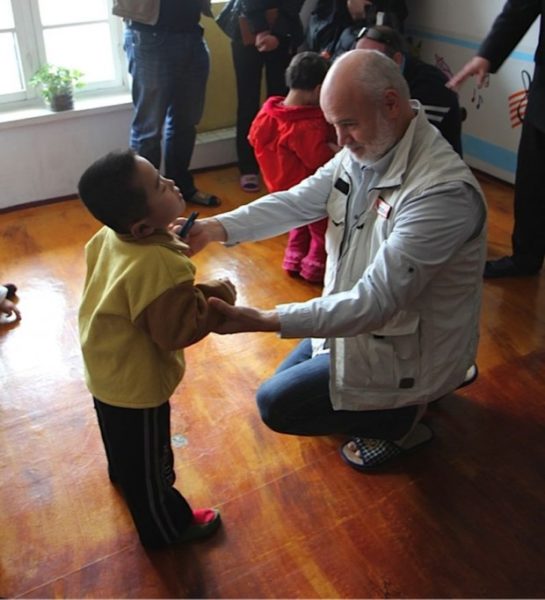Sándor Szenczy is a Baptist pastor and President of Hungarian Baptist Aid. This week we learned that a high-ranking official from North Korea’s Ministry of Foreign Affairs recommended that Pastor Szenczy build a Baptist House of Prayer in Pyongyang. On a recent trip to North Korea, the pastor was given the opportunity to speak in one of only two Protestant churches that exist legally in the enigmatic country and he also held formal talks with the regime. The end result was an agreement for Hungarian specialists in Conductive Education to work in North Korea helping disabled youth, especially those with cerebral palsy.
On the surface, this agreement with Pastor Szenczy and especially the plan to build a Baptist house of worship in virulently atheistic North Korea may seem odd. But it actually is not all that surprising. First, it would appear that when pragmatic considerations (foreign policy or foreign investment) warrant it, or if it can serve as a “showcase,” North Korea is open to the establishment of new churches. For instance, a Russian Orthodox church was built 15 years ago, with assistance from Russia. Kim Jong-il was apparently so inspired by the architectural beauty of a church he saw during a visit to the Russian town of Irkutsk, that he decided that one ought to be erected in North Korea. Thus began the life of the Church of the Life-Giving Trinity in Pyongyang.
At the moment, Pyongyang has four churches that operate legally (and some underground Christian communities as well). The officially sanctioned churches include a two Protestant congregations, a Roman Catholic and the Russian Orthodox church. The BBC published a report on churches in North Korea, based in part on the observations of someone who attended a religious services at the Protestant Chilgol Church. During that service, the BBC learned that there were about 20 worshipers present, mostly elderly women, with bilingual (Korean/English) Bibles printed in South Korea available in the pews. One may presume that this church is mostly meant for foreign citizens living in Pyongyang and visiting dignitaries. And it would not be a stretch to think that many of these churches exist mainly for show.
But there is a certain Christian influence in North Korea and it is permitted by the regime. For instance the small Pyongyang University of Science and Technology, established in 2010, was financed by American and South Korean Christians. BBC reports that a number of the professors are practicing Christians. Overt proselytizing is absolutely forbidden, but apparently professors will find creative ways to introduce students to biblical messages. For instance, it is considered acceptable to use Scripture verses as a learning tool in language classes. At the same time, there is absolutely no doubt that Christians face real and brutal persecution too. Canadian pastor Hyeon Soo Lim comes to mind, who received a life sentence in 2015, but was ultimately released on medical grounds, as a humanitarian gesture to Canada, which had advocated on his behalf.
In Pastor Szenczy’s case, we have a pastor whose experience far transcends religious issues. He is quite widely recognized as having significant experience and sway in cultural diplomacy. In 2007, he was formally recognized for his contributions to the “the International Relations of the Republic of Hungary.” The pastor’s political influence was also confirmed when he was one of two Hungarians invited to attend Donald Trump’s inauguration in 2016. The other Hungarian guest was Béla Szilágyi, Vice-President of Hungarian Baptist Aid. It is very clear that Pastor Szenczy has excellent political connections in the United States–in fact, he has met personally with four U.S. presidents and was invited to a garden party hosted by George H.W. Bush. He did have a run-in with Hungarian authorities in 2015, after tax officials discovered irregularities in his organization’s financial record-keeping and launched an investigation. It appears, however, that these issues were resolved.
Pastor Szenczy certainly has experience with North Korea. For instance, he traveled there in 2013 and prayed for peace on the Korean peninsula. He also used this time to begin an outreach program to North Koreans living with physical disabilities.
What is behind this involvement in the area of disabilities? The principles of Conductive Education (CE) were actually developed in Hungary by András Pető (1893-1967) and the Hungarian National Institute of Motor Therapy, established in 1950, was a pioneer internationally in the field of physical rehabilitation, especially in cerebral palsy. Methods that existed in Hungary in the sixties and seventies only gained recognition in the West in the eighties, thanks in large part to their representation in popular culture, particularly television. For instance, the 1986 documentary Standing Up for Joe follows five year old Joseph Horsley, a quadriplegic, who receives treatment from doctors in Hungary at the Pető Institute, giving the young boy and his parents hope that they had not had before.
Now Pastor Szenczy and Hungarian specialists are planning to bring hope to North Korea. It may be a story well worth following.




